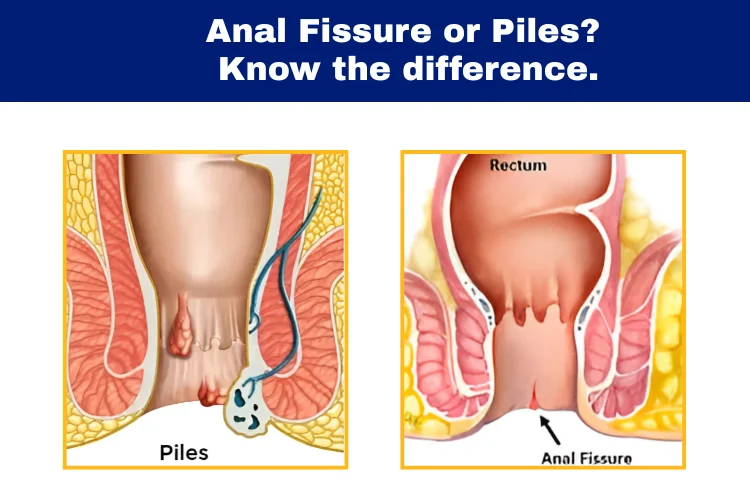When it comes to medical conditions such as hemorrhoids and hernias, gender can be a major factor in how these conditions arise and are felt. Although both men and women can have these conditions, the causes, symptoms, and risk factors may differ because of biological and lifestyle factors.
Understanding the Basics Of Hemorrhoids and Hernias
What Are Hemorrhoids?
Hemorrhoids are swollen veins in the lower rectum or anus. They can be internal or external and commonly cause symptoms like bleeding, itching, pain, and swelling.
What Is a Hernia?
Hernia occurs when an internal organ or tissue bulges through a weak area in the surrounding muscle or connective tissue, which may create a visible lump. Some examples of hernias are inguinal (groin), umbilical, and femoral hernias.
Gender Differences in Hemorrhoids
Do Hemorrhoids Affect Men and Women Differently?
Yes—while both genders are susceptible, the contributing factors can differ:
- Men: More likely to develop hemorrhoids due to heavy lifting, sitting for long periods of time, and straining while passing stools.
- Women: Pregnancy and childbirth are significant risk factors because of compression on the pelvic veins and hormonal fluctuations.
Hormonal Influence
Estrogen levels in women can impact vein elasticity, possibly making women more vulnerable during certain life stages, especially pregnancy.
Symptoms & Diagnosis
Because of anatomical differences and differing pain thresholds, women may report discomfort differently than men, even though symptoms are similar for both genders.
Gender Differences in Hernias
Are Hernias More Common in Men or Women?
- Inguinal Hernias: Much more prevalent among men as a result of the weakness that exists in the area of the groin with regard to testicle descent.
- Femoral Hernias: More prevalent in females, particularly elderly, because of the greater shape of the female pelvis.
- Umbilical Hernias: Frequent in infants of both genders, but among adults, frequently noted in women—particularly those with multiple pregnancies.
Symptoms Vary by Gender
- Men may experience pain or swelling in the groin or scrotum.
- Women may confuse hernia symptoms with gynecological issues, leading to delayed diagnosis.
Diagnosis & Treatment Differences of Hemorrhoids and Hernias
Hemorrhoids
- Men may delay seeking treatment due to embarrassment, often presenting with more advanced symptoms.
- Women, especially post-childbirth, are more likely to report and seek early treatment for discomfort.
Hernias
- In men, surgical repair is more common for inguinal hernias.
- In women, diagnosis can be trickier, especially with femoral hernias, as symptoms may mimic pelvic disorders.
Treatment Options for Both Genders
- Hemorrhoids: Life-style modification, drugs, laser treatment, and in extreme instances, hemorrhoidectomy.
- Hernias: Surgery is most often the best solution, and options range from open, laparoscopic, or robotic surgeries.
Preventive Tips Of Hemorrhoids and Hernias for Both Genders
- Avoid straining during bowel movements
- Maintain a healthy weight
- Strengthen abdominal muscles
- Eat a fiber-rich diet and stay hydrated
- Seek early treatment for symptoms
Why Choose GutCare Clinics for Hemorrhoids and Hernias Treatment?
GutCare Clinics in Bangalore provides comprehensive care for both hemorrhoids and hernias, with personalized treatment plans for men and women. We understand the gender-specific factors and approach each case with sensitivity and expertise.
- Experienced Specialist: Dr. Yuvaraj possesses extensive experience in the treatment of gastrointestinal and colorectal disorders.
- Advanced Treatment: From minimally invasive hernia repair to non-surgical hemorrhoid relief, we provide cutting-edge care solutions.
- Comfort-Focused Care: Gender-sensitive consultations ensure you feel heard and supported.
FAQs
1. Are hemorrhoids more painful for men or women?
Pain perception varies, but both genders report discomfort. Women may experience more hemorrhoids during pregnancy.
2. Can men get femoral hernias?
Yes, but they are less common in men and more frequent in older women due to anatomical differences.
3. What lifestyle factors increase hernia risk in men?
Heavy lifting, chronic cough, and obesity are major contributors.
4. Do women need different treatment for hemorrhoids?
While treatments are similar, women may need extra care post-childbirth and during pregnancy.
5. Can hernias be prevented?
While not always preventable, avoiding strain, maintaining weight, and strengthening the core can reduce risk.
6. Is surgery always needed for hernias?
Not always. Small hernias can be monitored, but surgery is often recommended to prevent complications.
Conclusion
Both men and women suffer from hemorrhoids and hernias, but anatomy, hormones, and lifestyle cause the causes, symptoms, and treatments to be different. Recognizing these differences allows you to look for early symptoms and timely proper care. Here at GutCare Clinics, we treat both conditions with specialization in mind—comfort, efficiency, and educating you—adapted to your individual needs.
If you’re experiencing symptoms of hemorrhoids and hernias, don’t wait. Visit GutCare Clinics in Bangalore for expert care and a personalized treatment plan.




